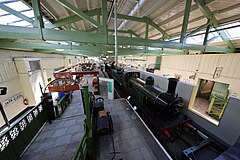
Darlington is a market and industrial town in County Durham, England. It is the main administrative centre of the unitary authority Borough of Darlington. The borough is a constituent member of the devolved Tees Valley area.
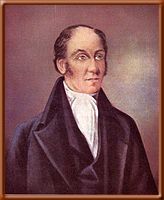
Timothy Hackworth was an English steam locomotive engineer who lived in Shildon, County Durham, England and was the first locomotive superintendent of the Stockton and Darlington Railway.

The National Railway Museum (NRM) is a museum in York, England, forming part of the Science Museum Group. The museum tells the story of rail transport in Britain and its impact on society. It is the home of the national collection of historically significant railway vehicles such as Mallard, Stirling Single, Duchess of Hamilton and a Japanese bullet train. In addition, the National Railway Museum holds a diverse collection of other objects, from a household recipe book used in George Stephenson's house to film showing a "never-stop railway" developed for the British Empire Exhibition. It has won many awards, including the European Museum of the Year Award in 2001.
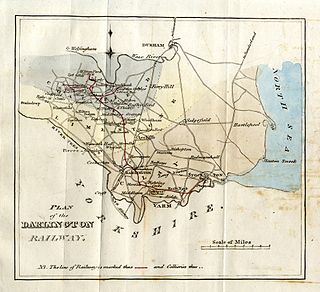
The Stockton and Darlington Railway (S&DR) was a railway company that operated in north-east England from 1825 to 1863. The world's first public railway to use steam locomotives, its first line connected collieries near Shildon with Darlington and Stockton in County Durham, and was officially opened on 27 September 1825. The movement of coal to ships rapidly became a lucrative business, and the line was soon extended to a new port at Middlesbrough. While coal waggons were hauled by steam locomotives from the start, passengers were carried in coaches drawn by horses until carriages hauled by steam locomotives were introduced in 1833.

Shildon is a town and civil parish in County Durham, in England. The population taken at the 2011 Census was 9,976. The town has the Locomotion Museum, due to it having the first station, built in 1825, and locomotive works on the Stockton and Darlington Railway.

Edward Pease, a woollen manufacturer from Darlington, England, was the main promoter of the Stockton and Darlington Railway, which opened in 1825. He is sometimes referred to as the "Father of the Railways".

Locomotion, previously known as Locomotion the National Railway Museum at Shildon, is a railway museum in Shildon, County Durham, England. The museum was renamed in 2017 when it became part of the Science Museum Group.
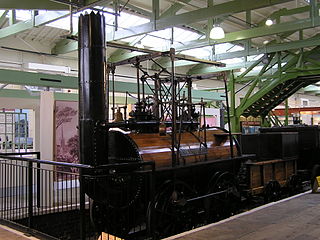
Locomotion No. 1 is an early steam locomotive that was built in 1825 by the pioneering railway engineers George and Robert Stephenson at their manufacturing firm, Robert Stephenson and Company. It became the first steam locomotive to haul a passenger-carrying train on a public railway, the Stockton and Darlington Railway (S&DR).

Darlington Works was established in 1863 by the Stockton and Darlington Railway in the town of Darlington in the north east of England. The main part of the works, the North Road Shops was located on the northeast side of the Stockton and Darlington Railway

Shildon is a railway station serving the town of Shildon in County Durham, England on the Tees Valley Line, between Bishop Auckland and Saltburn via Darlington. The station, situated 9 miles 8 chains (14.6 km) north-west of Darlington, It is owned by Network Rail and managed by Northern Trains.

North Road is a railway station on the Tees Valley Line, which runs between Bishop Auckland and Saltburn via Darlington. The station, situated 1 mile 23 chains (2.1 km) north-west of Darlington, serves the market town of Darlington in County Durham, England. It is owned by Network Rail and managed by Northern Trains.
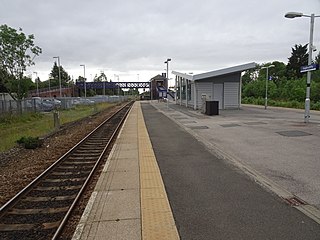
Eaglescliffe is a railway station on the Tees Valley Line, which runs between Bishop Auckland and Saltburn via Darlington. The station, situated 8 miles 63 chains east of Darlington, serves the village of Eaglescliffe, Borough of Stockton-on-Tees in County Durham, England. It is owned by Network Rail and managed by Northern Trains.

The A1 Steam Locomotive Trust is a Darlington, England based charitable trust formed in 1990 for the primary purpose of completing the next stage of the locomotive heritage movement, the building of a new steam locomotive from scratch. This project became the construction of 60163 Tornado, carried out by Locomotive Construction Co Ltd, a wholly owned subsidiary of the A1 Trust. After over 15 years of fundraising and construction, Tornado steamed for the first time in January 2008.

Hopetown Carriage Works, also known as the Stockton and Darlington Railway Carriage Works, was a carriage works of the Stockton and Darlington Railway built in 1853 in Hopetown, near Darlington, County Durham, England.

Tees Marshalling Yard is a railway marshalling yard, used to separate railway wagons, located near Middlesbrough in North Yorkshire, Northern England.

The Hetton Colliery Lyon or Lyons is an early British steam locomotive that still survives in preservation. It is remarkable for having continued working into the early 20th century.
Anthony Coulls is a British museum curator and historian. He is the Senior Curator of Rail Transport and Technology at the National Railway Museum, the author of several books on railway and industrial history, and is active in the steam heritage movement.

Beamish Museum contains much of transport interest, and the size of its site makes good internal transportation for visitors and staff purposes a necessity.

The Skerne Bridge is a railway bridge over the River Skerne in Darlington, County Durham. Built in 1825 for the Stockton and Darlington Railway, it carried the first train on the opening day, 27 September 1825. It is still in use, being the oldest railway bridge in continuous use in the world. It is a Grade I listed building.
